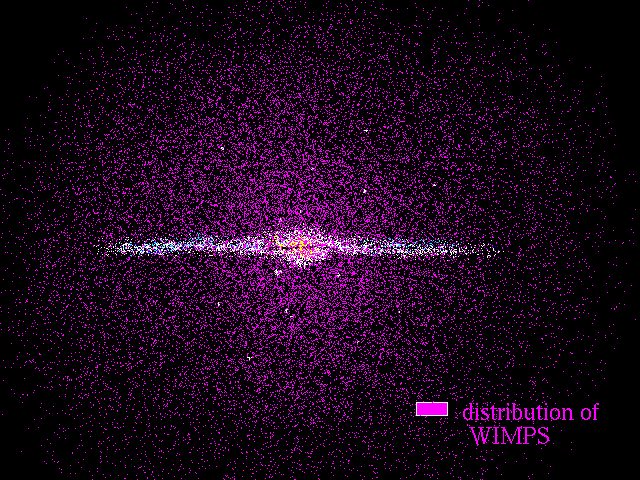Weakly interacting massive particles
as dark matter candidates
What does ``weakly interacting massive particles'' mean?
- Elementary particles.
- Very tiny interactions with ordinary matter.
- They don't attract or repel ordinary particles with
electrical forces.
- and they don't emit or absorb photons.
- They don't feel the strong nuclear force that binds protons and neutrons
to make nuclei.
- With hardly any interactions, they would be very hard to detect.
- But it is presumed that they have the same sort of gravitational
interactions as ordinary matter.
- Neutrinos almost fill the bill:
- They don't attract or repel ordinary particles with
electrical forces.
- They don't feel the strong nuclear force that binds protons and neutrons
to make nuclei.
- With hardly any interactions, they are very hard to detect.
- The only problem with neutrinos is that if they are really
massless, then their gravitational interactions aren't strong enough.
- Of the three types of neutrinos, maybe one or two have enough mass
to allow them to be an important part of the mass of the galaxy.
- We know that the mass of the electron neutrino is very small, but
our experimental knowledge of the mass of muon neutrons and tau neutrinos
is quite limited.
- Maybe the WIMPS needed are a kind of particle that hasn't been
discovered yet.
The picture:

- The WIMPS have a spherically symmetric distribution centered on the center
of the galaxy.
- They are evenly spread out, not clumped.
- They provide much of the gravitational force that holds the visible
part of the galaxy together.
An interesting question to think about: could there be massive particles
that are weakly interacting with ``ordinary'' matter but strongly
interacting with each other? Maybe we are made of type A matter and there
is another kind, type B, that doesn't interact with type A except by
gravity. There could be type B stars, type B planets, type B people ....
This idea doesn't work so well when you think it through, but it's
fun to consider.
Davison E. Soper, Institute of Theoretical Science,
University of Oregon, Eugene OR 97403 USA
soper@bovine.uoregon.edu
